Pickathon 2017 [Part 2]: Friday (Jonathan Richman, Big Thief, Marlon Williams, etc)
Day 2 of the festival was packed with a couple of legendary songwriters, large ensembles, and international acts representing Colombia to New Zealand
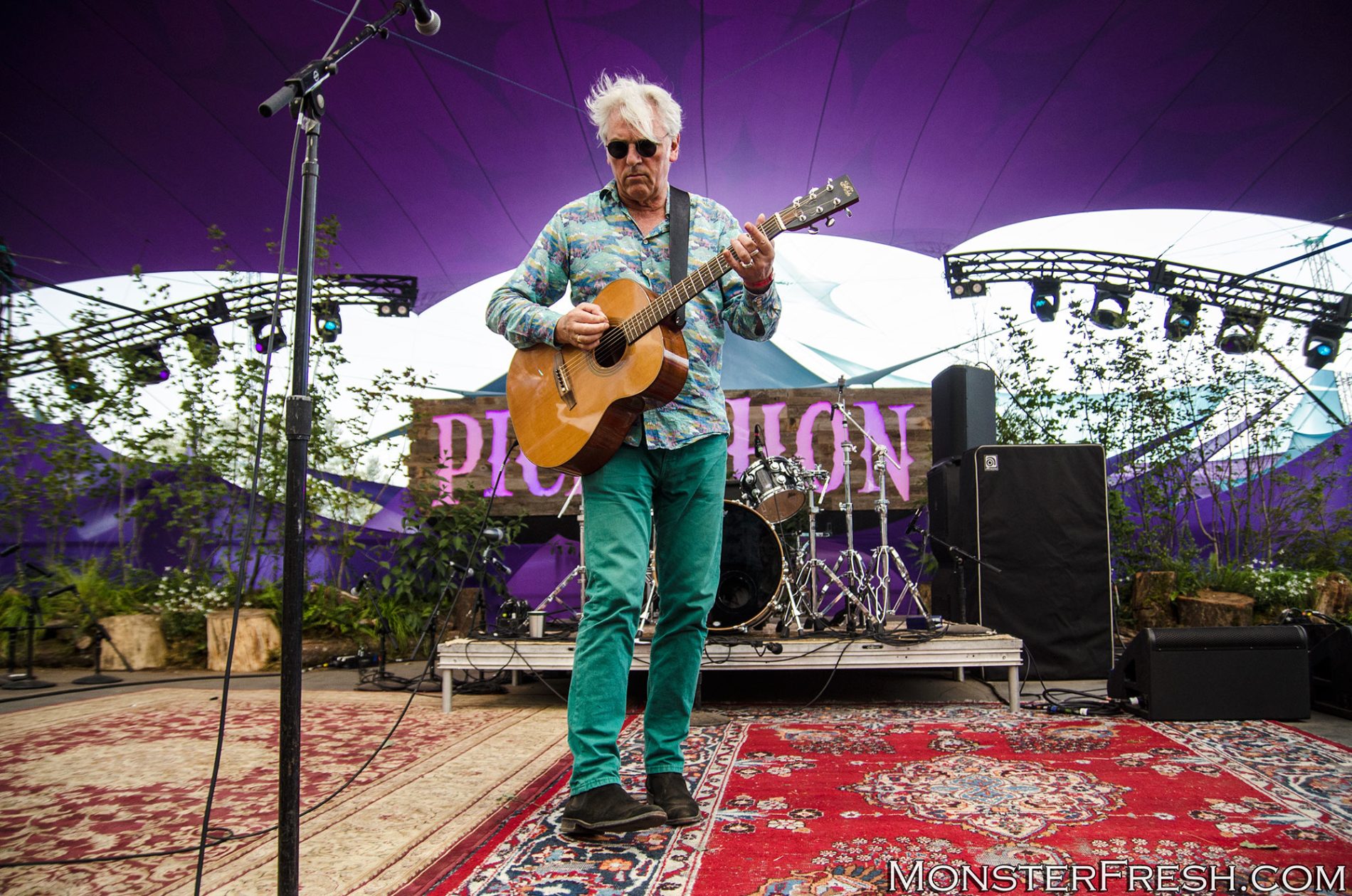
After waking up in the tent and pre-ordering a new Ricky Powell book on my phone, Friday began with us making our way back to the main stage to see Robyn Hitchock. The 64-year-old Englishman entered solo with his acoustic guitar. His stark white hair contrasted with his dark sunglasses and he was wearing turquoise pants, and a matching flower print button-up. The first thought that popped into my head was that he looked almost too much like Robyn Hitchcock, as if they had hired some uncanny doppleganger to appear at the festival. This guy was good.
It was a relaxed scene with the songwriter pulling from different eras of his 40-plus year career. I first became aware of him as the namesake behind the 1980s/early-90s project, Robyn Hitchock & The Egyptians and, during his set, he reached back to some of the more abstract material that he’s known for, like “My Wife And My Dead Wife” from his 1985 debut album with the group, Fegmania!. But Hitchcock‘s first real notoriety came in the late 1970s as the frontman for neo-psych folk outfit, The Softboys. The group originally disbanded after their universally acclaimed Underwater Moonlight LP [1980], from which Hitchcock performed the song, “I Got The Hots,” displaying the humor that his songwriting is also known for.
His personality and light-hearted interactions with the audience played an equal role in his performance and appeal. Early on, he joked in his British accent, “As you can probably tell, I’m from Nashville, Tennessee,” clarifying later that he actually does, in fact, reside there now. And, before diving into a new song, he would address the soundman, at random points in his set, with requests like, “Sam, could you make this one sound like it’s fun?” or “Make the guitar sound like a full band produced by Tony Visconti.” Referencing his drug and sex-filled youth, he stated, “I was young once, but have no memory of it.” Adding, “I only remember older people telling me I was having the time of my life.” Based on what we saw, Hitchock seems to be enjoying himself plenty these days, as well, and he’s happy to carry his fans along with him.
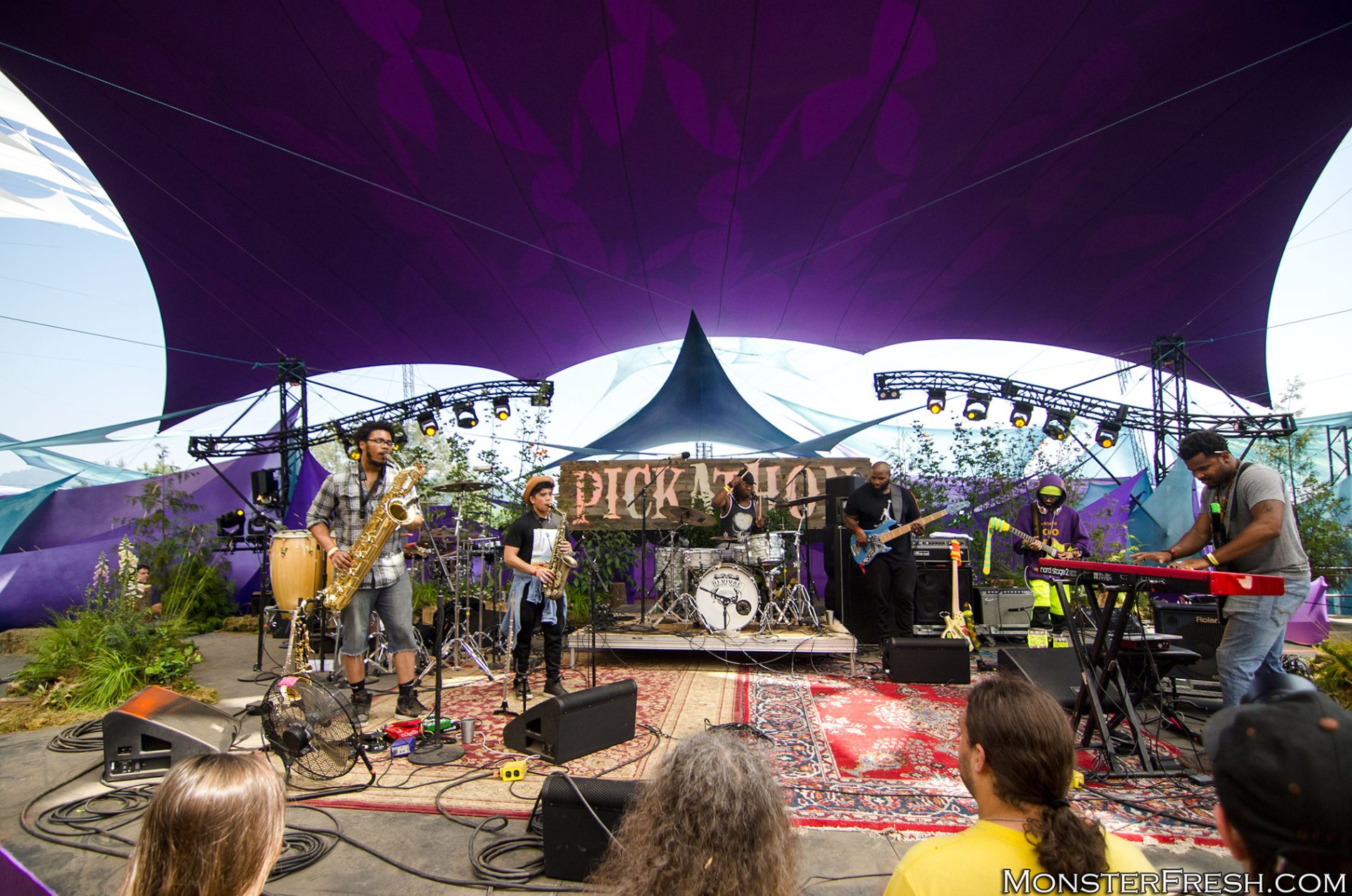
We didn’t have anything on our schedule to hit until Jonathon Richman later in the day, so we opted to stick around the main stage for a bit. The next act was Ghost-Note, a 7-piece ensemble who we were being told killed it the night before with a late night set in the Galaxy Barn. Though they were large in number, the only official members listed for the group are drummer, Robert “Sput” Searight and percussionist, Nate Werth, both of the Grammy Award-winning Denton, Texas jazz fusion monsters, Snarky Puppy. Lead by bassist, Michael League, Snarky Puppy features its own massive rotating membership of highly skilled musicians and, according to the literature for Ghost-Note, this live band is simply an evolution and extension of Searight and Werth‘s desire to explore a more percussion-centric project “expanding their percussive voice into a night of melody through innovative grooves and captivating artistry.” They do so by taking inspiration from artists that include James Brown to J Dilla and Beastie Boys, while drawing from styles that run the gamut from jazz, Funk, Afro Cuban, hip hop, samba grooves, and beyond.
Along with Searight and Werth, the lineup for Ghost-Note included frequent collaborators, Sylvester Onyejiaka (flute, tenor, and baritone sax) and bassist AJ. Brown. Not present was Nate‘s brother, Nick Werth who was likely busy with his solo project, Galaxe, and is known for operating a unique instrument called the Xylosynth, which is listed as combining “the technologies of MPC’s, samplers, and synthesizers.” They did, however, have someone manning a Nord Stage 2 EX while a keytar was strapped to his body; a second woodwind player; and even a second bassist, by the name of MONO NEON.
How do I know that the second bassist’s name was MONO NEON? Everything that he was wearing or holding was labeled with his name, from the oversized tongues on his sneakers to the headphones resting around his neck. We were in the middle of a heatwave that was reaching heights of 107 degrees, yet, In one of the boldest moves of the weekend, he was sporting a neon yellow stocking cap covered by a purple sweatshirt, which was stamped with his moniker repeatedly across the front, as well as the sides of its pulled up hood. It’s an effective marketing technique that is clearly paying off, evidenced by that I know his name, was prompted to research more about him, and am discussing him right now. With just a quick glance at his wikpedia page, the man born Dwayne Thomas JR and formerly known as Poly Neon unveils himself as an interesting and accomplished figure in his own right. Although he is right handed, he plays his 5-string (also adorned with “MONO NEON” stickers) “upside down” with a striped neon tube sock on the head stock. A “Youtube sensation,” Thomas had also been working with Prince at the time of his death, already becoming a member of the house band for his Paisley Park After Dark Jam Sessions.
Later in the day, the other 5-string bassist, AJ Brown happened to sit next to us at a table in the food area. He was eating some biscuits from Pine State and suggesting some other food that we should check out while we were at the festival. He explained to me that, although they are officially stationed in Dallas,members reside in various parts of the country. To remedy this, they generally arrive in a city that they are expected to play a few days beforehand and rent a practice space to prepare for it.
Acts like Ghost-Note are an example of the variety that Pickathon looks to incorporate in their eclectic lineup. Their musicianship was impressive, but I can see how a late night set on another stage may have been an even more conducive environment for me to appreciate what they bring to the table.
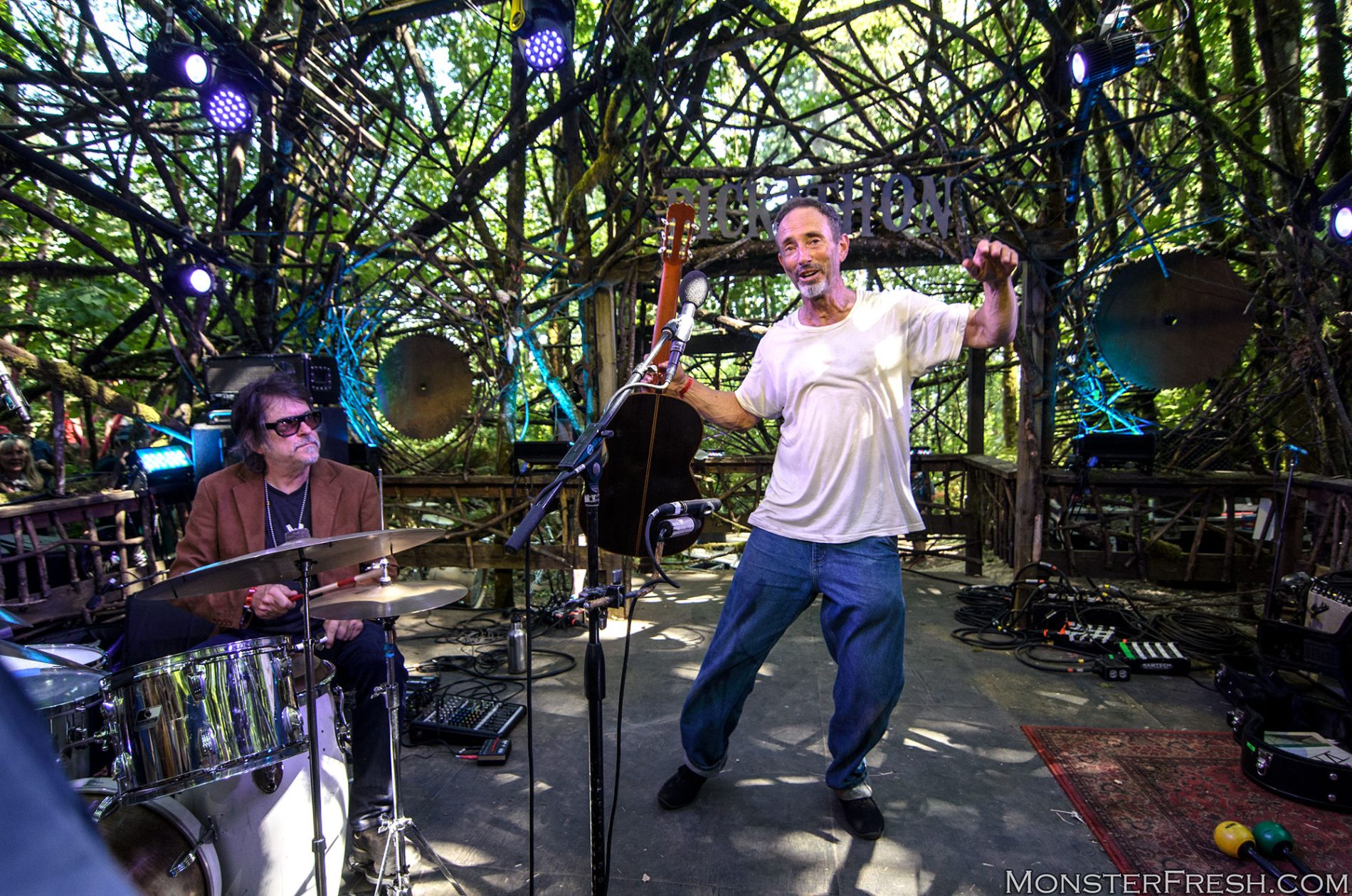
If there was one artist over the weekend that has the ability to rival the sincerity of Charles Bradley, it’s Jonathan Richman. The core of his act stems directly from his personality and exudes a pure and rare authenticity. That is to say that isn’t an “act” at all. Performing with his longtime collaborator, Tommy Larkins, on drums, Richman strums at his acoustic guitar, plucking occasionally, and only laying it down to break into less spastic Andy Kaufman-esque dance moves or exchange it for a set of maracas. His live shows are well known for being incredibly personal and intimate with an engaging delivery, and the living legend speaking to the audience throughout.
The fact that we were able to catch a mid-day set with him playing on the Woods stage was a luxury that didn’t escape me. Located in a clearing of the very woods we were camping in, the aptly titled stage has a striking aesthetic. Constructed out of branches to form a dome shape, it always reminds me of something straight out of an Ewok village. Whenever anyone sounds cynical about the idea of Pickathon being anything more than just another standard music festival, I show them photographs of the Woods stage and their entire demeanor tends to change immediately.
Jonathan has been performing in this sort of more stripped down format for the majority of his career, at this point, but he first truly gained fame for his highly influential proto-punk outfit, The Modern Lovers. in the 1970s. The fascinating thing about the Lovers is that they had already broken up two years before their groundbreaking self-titled debut album — recorded in 1972 — was ultimately released in 1976. By the time they disbanded, Richman was already determined to pursue a more mellow approach to songwriting and began to disown much of his older material that they were working on. The frontman was a notorious Velvet Underground fan and their influence can be heard on those early recordings, many of which were produced by founding Velvets member, John Cale. But The Modern Lovers have gone on to make a tremendous impact of their own, not only through the work of members like David Robinson and Jerry Harrison, who went on to form The Cars and join the Talking Heads, respectively, but in how Richman‘s songwriting went on to influence artists like fellow Bostonites, The Pixies, while the Sex Pistols, Iggy Pop, and David Bowie all went on to cover their material. In 2013, a bill was introduced proposing that “Roadrunner” be made the official song of Massachusetts, but Richman‘s response to the suggestion was that he didn’t “think the song is good enough to be a Massachusetts song of any kind.”
It’s easy to wonder how someone might feel about still being associated so closely with a project that they discarded and walked away from over 40 years ago, when he’s consistently produced so much more amazing material since then, but Richman isn’t just anyone. Plus, the truth is that, while mentioning Modern Lovers yielded nothing in trying to describe to someone at the festival where they might know him from, Kim succeeded in pointing out that he and Larkins were the duo performing the musical segues in There’s Something About Mary, so he might actually be more widely known for that outside of the world of music nerds. But in the end, I don’t believe that Richman yearns for that level of attention, either way. In fact, I heard on the street that, to book him for Pickathon, they had to fax in their request to him while mentioning that he’d played the festival before. Richman is also notorious for either requesting that he is not photographed during his live performances, or is shot from off to the side, out of site. No such stipulations were forwarded or expressed to me, this time around. I wasn’t sure if that was a byproduct of the less than stellar communication provided by the publicists hired for this year’s festival, but if so, I planned to exploit this oversight, getting direct shots of Jonathan from up close, while trying to be receptive to any indicators that it might be pissing him off. He didn’t seem to mind and even smiled and made direct eye contact on several occasions, which I like to attribute to the fact that my intention to be respectful was clear and that I wasn’t just there shooting a concert, I was fully engaged in his performance, attempting to project that appreciation back in his direction.
His solo material is incredibly raw and more understated than his more raucous early material, and his live shows feel as if he’s literally reaching out and placing his work directly in your hands. He began this one by tapping into the moment with “That Summer Feeling” from his 1992 album, I, Jonathan. With lines like “Do you long for her or for the way you were?” it’s a perfect of example of how, although his work may seem simple or even childlike to some, it’s operating on a much deeper level than might be immediately apparent to some. Richman isn’t likely to throw down some mindbending feat of musical technicality like a Ghost-Note might, but his songcraft is beyond heartfelt and affecting. He continued on with songs about bonfires and poolside, odes to specific feelings and emotions. As usual, Jonathan took intermittent pauses to thank the audience, and sung select verses in Italian or French for particular songs.
There are tracks that I’ve seen him perform live on multiple occasions, yet he still found new ways to deliver them. For the upbeat, “I Was Dancing In A Lesbian Bar,” he paused to stress that it wasn’t about what it was, “it’s about what it wasn’t.” Adding that, “At 4am, no one cares.” For “No One Was Like Vermeer,” from his 2008‘s Because Her Beauty Is Raw and Wild., he imparted facts about how it was discovered that some of the Dutch painter’s work was actually painted by his 18-year-old daughter, often self portraits of herself. He opened himself up speaking and singing of overcoming a fear of water, and then went into his version of “Mother I Give You My Soul Call,” from the late spiritual guru Paramansa Yoganada who is known for spreading teachings on meditation and kriya yoga to the western world. It’s something that I have a personal connection with, as my parents frequented Yogananda‘s self realization fellowship in Los Angeles in their youth and my father’s memorial was even held there at Lake Shrine. I realize now that meditation is a practice that Richman has been practicing as far back as his days with the Modern Lovers and, furthermore, it’s something that he’s very conscious of his music having the potential to simulate for the listener, centering them to a degree. Albeit it a more subtle approach than blistering guitar rock, he knows what he’s doing. If there’s one thing that you’ll take away from a Jonathan Richman show, it’s the feeling.

Whether it’s the most intelligent or logical move or not, I typically have a general idea of who I plan to see before heading to Pickathon and, figure that I’ll just fill in any gaps when they arrive. Rather than beginning to look up every artist on the schedule, I ignore a number of them intentionally, just so that I don’t have another “must see” act thrown into the mix and, potentially, create conflict. In other words, I remain ignorant and blind on purpose. Truth be told, this also consistently results in me recognizing that I would have enjoyed one act or another that I’ve missed, after the fact, but by that time, I’m already pleased with how I’ve spent my weekend. After hearing the name Big Thief brought up a number of times, however, I decided to go ahead and look up their NPR Tiny Desk concert. As could be expected, I was sold on them immediately, and they quickly rose up the list of priorities for us to see. Fortunately, they were also playing at the perfect time back over on the MT Hood Stage.
It’s hard to categorize what the Brooklyn 4-piece creates, because it truly does feel unique to the individuals involved. They definitely mix in elements of folk rock, but in the way that a Grateful Dead or Neil Young might, where there’s random instrumentation and tones injected in to mutate the sound and add both emotion and dimension to the tunes. The important part is that those accents and elements are always true to the songs and benefit them, never feeling contrived or forced for abstract novelty. As for vocalist/guitarist, Adrianne Lenker, she’s a fucking gem. It will sound vague unless you’re familiar with it, but I’m at a loss to come up with a better descriptor for the sound of her vocals other than “timeless.” Additionally, her songwriting is impeccable, featuring organic characters painted into humanly poetic circumstances with genuine depth. Lenker and her bandmates have a wondrous chemistry with the instrumentation laying out beautiful yet subtle landscapes for her storytelling to unfold and live within. Meanwhile, guitarist Buck Meek is a star in his own right. As with the other two members — drummer, James Krivchenia, and bassist, Max Oleartchik — Meek is visibly overcome by the music they are creating, which manifests into various jolts and tweaks in his body and facial expressions as he performs it. I assume that many reviewers are likely to make note of his unorthodox physical reaction, but these physical movement directly align with his unorthodox and inspired approach to his instrument. Big Thief may be Lenker‘s project — Buck referred to her with reverence as “the boss” at one point — but the unique notes and guitar lines that Meek selects are as much a part of their overall sound as anything.
Their set involved a blend of tunes from their critically acclaimed debut, Masterpiece, and their recent followup, Capacity, which is already garnering some tremendous feedback. I can type my rambling bullshit for you all day, but the best way to see what they are all about is to hear and/or experience it for yourself. My suggestion is to find footage of them from the Pickathon feed, if available, or to simply check out that same Tiny Desk concert that I did. Then see if you can shake the melody from the song “Paul” out of your head. I already know that I can’t fucking do it.
Partway through the show, I tried to casually lift my camera off from around my neck and, somehow, cracked myself dead in the forehead with it. Spaced out from the summer heat, it all happened in slow motion. During this mini ordeal, I was standing right in the middle in front of the stage, slightly dazed as Kim slowly tapped the blood off of me with a wet wipe each time the blood pooled into my cut enough to look like it might drip. It was often. On a positive note, since this set was filmed as part of the live stream, there’s a good chance I made the cut (pun intended) and am visibly looking like a disheveled wingnut in the video.
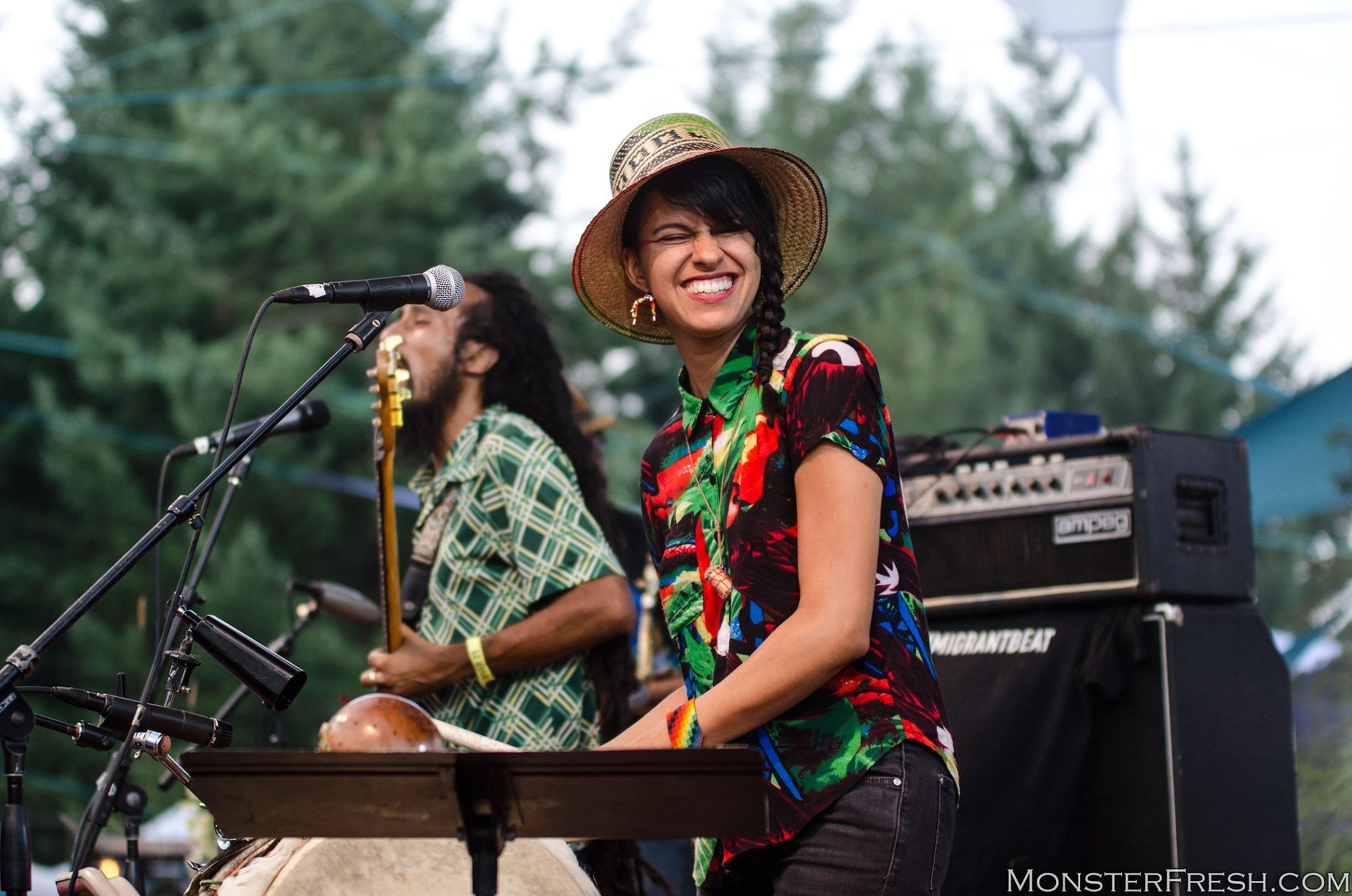
I’d never heard of M.A.K.U. Soundsystem until they started playing, but they create the kind of music that draws you over to it. We’d already left the main stage area for some time, eaten some food and wandered around the premises, but I now found myself sucked back over to it like a magnet by this massive ensemble that was firing off an onslaught of infectious grooves.
Earlier in the day, we had unknowingly walked by their bassist who was wearing a track jacket with the word “IMMIGRANT” embroidered across the back and now it all made sense. These days, they now call New York home, but the fact that they are all immigrants is a huge part of their identity on a number of levels. The video to their track “La Inevitable” openly addresses the concept of retaining cultural identity along with issues of displacement and gentrification within their adopted city and elsewhere. The majority of the 8-piece band hail from Colombia and they incorporate the rhythms from their homeland and sing in Spanish, but the larger concept behind the group is the melding and merger of their respective cultures, which is something that they have honed into their trademark sound since their inception in 2010.
Regarding their background and mission statement, the majority of information can be found on their Facebook page‘s “about” section, which explains that the name MAKU is borrowed in part from the Nukak Maku tribe which is “indigenous to the Southern part of Colombia” and was miraculously able to remain without any outside human contact until the late 80s, but has since been persecuted and had their land torn away from them. Additionally, the term “Maku” also translates to “low class person” from the indigenous language of Southern Colombia. These inspirations are reflected in the group’s D.I.Y. approach to their craft and the uplifting nature of so much of their music. The amalgamation of sounds that they incorporate have elements of Caribbean rhythms, funk, psychedelia, punk, and even hip hop at moments, within particular vocal deliveries. Likewise, their instrumentation includes more traditional drums and horns blended with synthesizers, electric guitar, and bass. M.A.K.U can be an incredibly high energy outfit, but they do have slower more calculated tracks in their repertoire. I can’t tell you everything that they’re singing about, but the emotion bleeds through. M.A.K.U Soundsystem hit me as equal parts rebellion and celebration, of standing firm in ones own identity, while uniting into something even greater than the sum of its parts. It’s a message they seem hopeful that they will be able to impart on the rest of us through their music, subconsciously or otherwise.
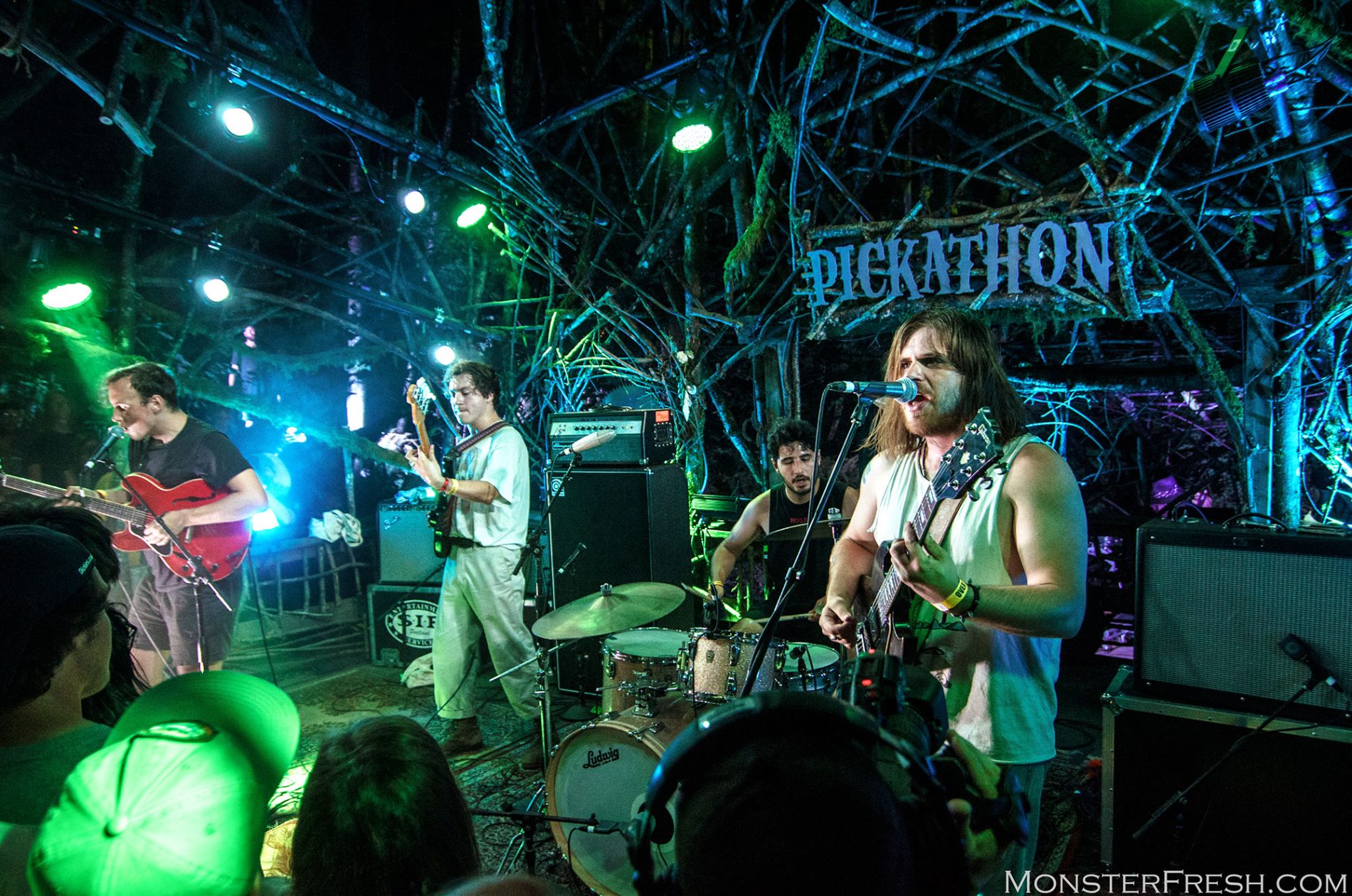
Before Meatbodies ever played Pickathon in 2015, it wasn’t difficult to speculate that they’d appear on the bill, eventually, if for no other reason than their associations. Frontman Chad Ubovich is closely linked to the growing garage-psych scene presently concentrated in the Los Angeles area — and previously San Francisco — which includes Pickathon alumni like Thee Oh Sees, Mikal Cronin, White Fence, and Ty Segall, the latter of which has come to consistently play the festival year after year with one project or another. Ubovich previously appeared at the festival himself, as a member of Mikal Cronin‘s band and also operates as the bassist for the Segall and Charles Moothart trio, FUZZ. Although the lineup has since stabilized, Meatbodies began with an ever-shifting backing band supporting Ubovich, which initially included Cory Hanson of Wand and Ty Segall & The Muggers, both of which he has performed at Pickathon with in the past. This collective of artists, which also includes figures like Kyle “King Tuff” Thomas and Emmett “Cairo Gang” Kelly, makes up a pool of frequent multi-instrumentalist collaborators resulting in an an endless number of potential formations, mutations, variations, and stylistic shifts to experiment within.
While there are still general plans to put out another FUZZ album at some point in the future, and I doubt that new side-projects or collaborations are completely off the table, Meatbodies is not only Ubovich‘s primary focus at the moment, but one that has truly coalesced into a more of a “band,” than simply a solo-project with some pals helping out. The evidence can be heard in their interplay, especially in a live format, and the new album, Alice, even features guitarist, Patrick Nolan, handling the vocals on one of the tracks. For Alice, Chad crafted it as a loose concept album, based around the general message that, as impermanent beings, we should try to avoid getting caught up in the negativity and restrictions associated with organized religion, politics, and other societal structure, instead focusing more on enjoying existence through physical pleasures and in the pursuit of artistic endeavors. Contrasting from their more aggressive punk-tinged debut, the new album takes things in a slightly more methodical direction venturing into prog-like detours and pathways. All this isn’t to say that, in a live format, they can’t still get just as amped up as ever.
Every year, Pickathon has at least one band like Diarrhea planet or Parquet Courts dedicated to making the crowd go apeshit out in the woods and, this year Meatbodies filled that role admirably. In the past, these sets often fell a little earlier in the evening, with the the Galaxy Barn taking on the brunt of the rowdier acts late night, but this new approach with people losing their minds in the dark like some kind of primitive ritual definitely works. I’d be lying if I said that Meatbodies didn’t still present some very obvious overlap with the music produced by their more recognizable cohorts like Segall, but the quartet truly does feel as if they have stumbled upon their own unique sound and place within this neo-garage-psych world. From their position in a smoke-billowing stage resembling some form of massive illuminated upturned birdcage, they discharged a wall of sound like a steaming train into the faces of the crowd, twisting and turning relentlessly without ever hitting the brakes. Squealing guitars swirled over rapid fire drumfills as young teens came flipping out of the mob and on top of the swarm to crowd surf. If Ubovich‘s message is truly one of living in the moment, it was being received loud and clear.
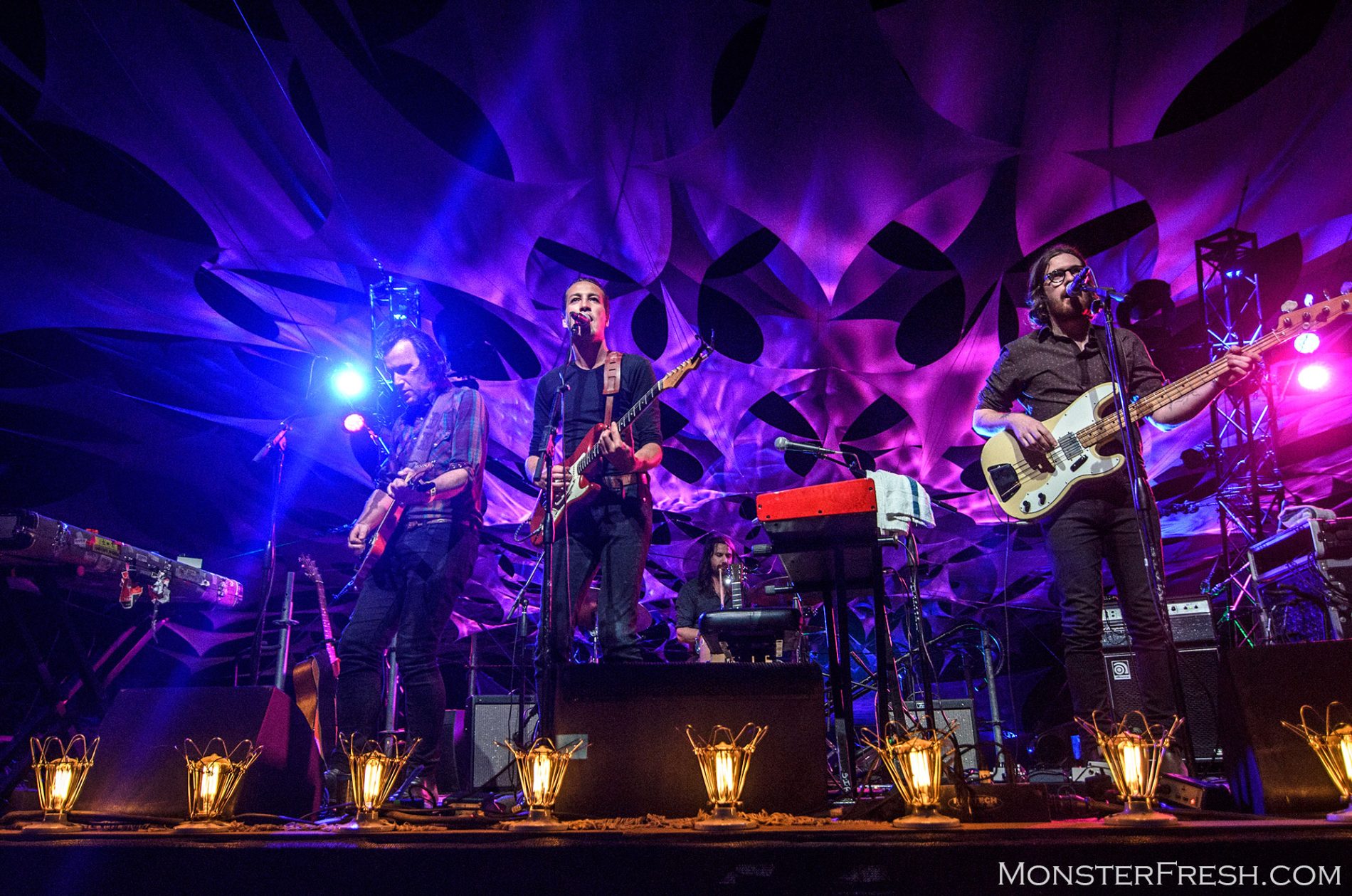
One set that we didn’t have any intention of missing was Melbourne-based New Zealand transport, Marlon Williams on the Starlight Stage. We previously caught the musician/songwriter in Seattle back in January of 2016, a couple of weeks before his self-titled debut was released through Dead Oceans, and were pleasantly surprised. It turns out that, even though the material may have been new to us, the LP had already received a release in his home country and Australia a full 9 months prior. In witnessing him live then, the main thing that became very apparent to us was that, until you see him live, it’s difficult to fully grasp the scope of his talent and what he’s capable of.
There was plenty to admire the first time around, but his appearance at Pickathon demonstrated that Williams has only gotten exponentially better and settled into his material even further, a full two years after it was originally distributed the public. There is now a new level of confidence that he exudes that translates into a sort of effortless power rather than arrogance. As Kim described it, Marlon‘s sound is part Jeff Buckley and part Roy Orbison, with a little dose of Chris Isaak sprinkled in. The first thing that anyone will mention to you after witnessing him perform his tremendous vocal range. This can be partially attributed to the fact that the singer has a choir background, and he has only gotten better, as far as his ability to wield his gift at its full magnitude. His control is awe inspiring and it was that voice that overcame the crowd, leaving them mesmerized as if frozen in some manner of sonic tractor beam.
With the lights playing hypnotically off of the canopy in the backdrop, Marlon and his 3-piece backing band, The Yarra Benders, kicked into their set with, “Dark Child.” Perhaps my favorite of his originals, there’s an incredibly cinematic video for it that compliments the track. Since this song is the one that always stands out in my mind when thinking about the songwriter, I partly wondered how the set would progress, if he was already starting out with what I had viewed as some of his strongest material. The answer to that question turned out to be “incredibly well,” as it only set the tempo for what was easily one of the most memorable performances of the weekend. “Dark Child” wound up proving to be little more than a jumping off point.
The songs that the 26-year-old crafts often play like miniature short stories or vignettes with characters that reveal themselves just enough to get a sense of their intentions or who they might be. But while they do work as recorded content, it’s when they’re performed live that they truly find their footing. Seeing him again reminded me what drew us to him in the first place and the live versions help to offer a new depth and appreciation for the recordings. His sound draws from a number of familiar elements, from country-western, folk, and roots to rockabilly, bluegrass, and even the murder ballad — in tone, if not subject. He has referred to his self-titled release as each song representing a different character, and it’s his ability to embody those characters and inhabit those worlds that allows him to venture into some otherwise “old timey” terrain without ever feeling contrived or derivative. For this show he presented some new tunes with very distinct themes, including a cut titled “Party Boy,” which operates as a threat for someone to keep their paws off of his significant other, and “Vampire Again” which is described as a “tragicomic” tale about a “societal outcast.”
Three of the tracks on his album were covers, so it’s not surprising that this show also included its fair share, including a wonderful version of Yoko Ono‘s “No One Can See Me Like You Do.” but the remarkable thing is how Williams not only makes these tracks his own, but possesses them in a way that feels as if they are pulled directly from his own soul. His rendition of Bill Fury‘s 1965 pop crooner, “I’m Lost Without You” had an almost haunting, spaghetti western quality and reflected the heartbreak of the original, while operating as a platform for Williams to truly belt out his soaring vocals. But it was definitely his penetrating rendition of the traditional, “When I Was A Young Girl,” and the overwhelming power behind the sustained vibrato that he unleashed, which truly shook the crowd and officially broke anyone who might have still been on the fence and holding out.
It was a pretty dynamic set, exhibiting both raw vulnerability and strength, while balancing technical skill and emotional substance. The show was divided by a first half where the crowd sat stupefied by the performers pure magnetism, and the second half, prompted by the frontman’s announcement of some “fast music” followed by the uptempo, “Miss Lonesome,” where they rose to their feet to move more freely. Williams ended his time with a stirring rendition of the sultry “Portrait Of A Man” by Screaming Jay Hawkins. Laying down his guitar and gripping the mic, he poured everything that he had left into his final song, falling to his knees and erupting with the auditory equivalent of magma. I was pleased to see that his stage show had progressed so tremendously since we last saw him, now on par with the cinematic aspects so prevalent in his videos. Behind me, I could hear a middle-aged women fawning over the performer to Kim, first commenting on his tremendous vocal talent and then stating something to the effect of how she could only imagine how he keeps the ladies off of him. It was the type of show where you have to imagine that everyone in attendance was impressed by what they’d seen, but overhearing a “heterosexual” man referring to Marlon Williams by expressing to his friends that he’d probably “fuck him,” in such a genuine tone, is a ringing endorsement that’s difficult to top.
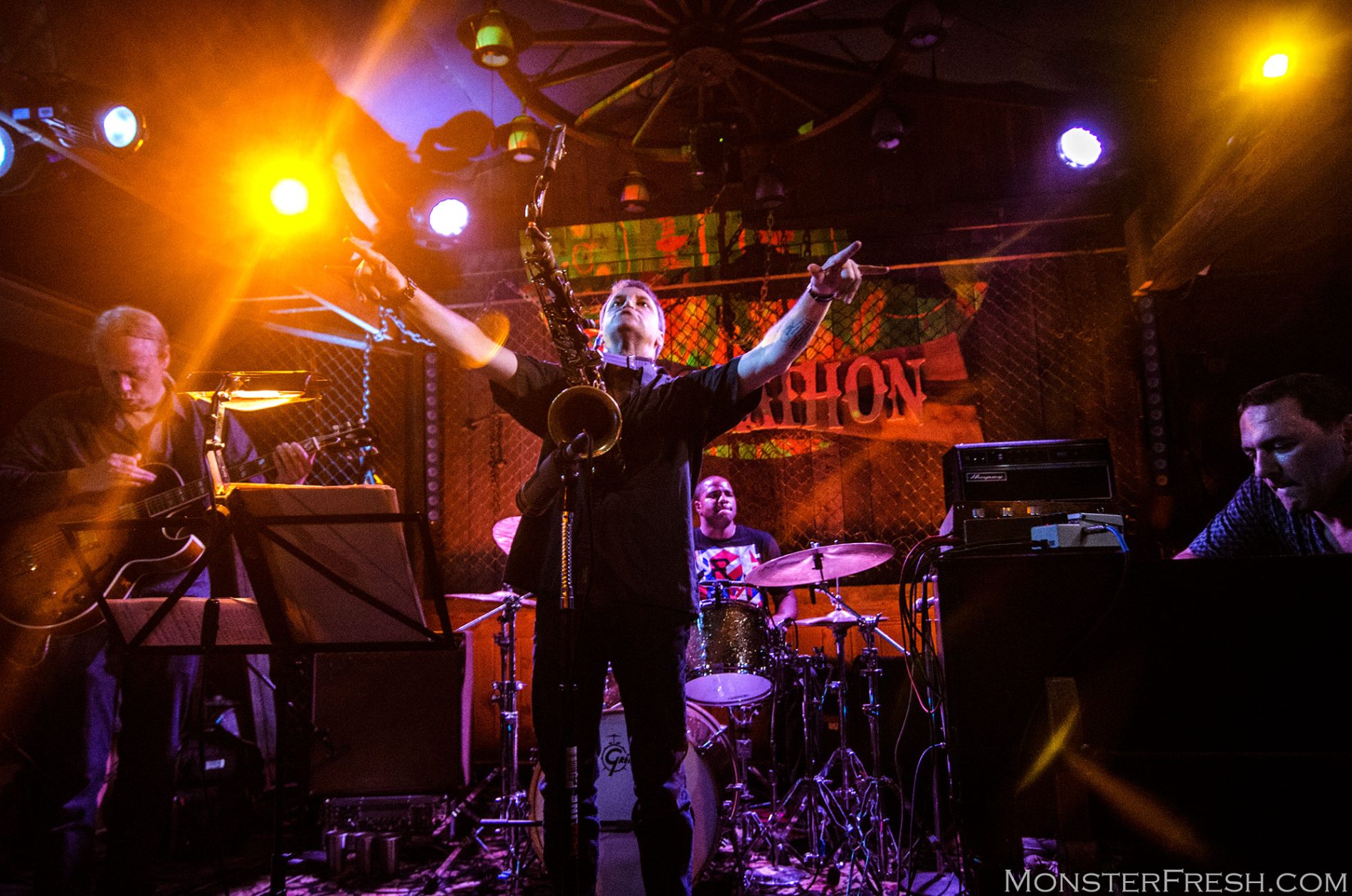
I was excited to see McTuff perform with Skerik in the Galaxy barn, aware that this would likely be a set where only a handful of us truly had an idea what we were getting ourselves into. As I touched on earlier, super late night sets in the barn were typically reserved for acts that fell more along the garage-punk spectrum, in the past, but if you were planning to book a jazz outfit in that slot, you’re not likely to find yourself a better option to go with.
When I first started hearing about McTuff, Skerik was actually an official member of the group, but for several years now, they have essentially remained a trio consisting of organist Joe Doria; Andy Coe on guitar; and a drummer, Tarik Abouzied who joined them in 2012. Ultimately, McTuff is the brainchild of Joe Doria and their site currently states that they are operating as a four piece with a completely new set of players backing him. With Andy fronting his own group and Skerik being involved in no less than 6-million consecutive other projects at any give time, it’s unrealistic to expect any iteration to stay together forever, but that’s what made this appearance so special to witness — it doesn’t come together like this much anymore. And with Dvonne Lewis behind the kit, it didn’t only mean that we were about to catch some of Seattle‘s best resident jazz talents throw down together, but it also marked the return of the very fiirst, ORIGINAL McTuff lineup.
Skerik is a Seattle staple with tremendous versatility that has been involved in so much different shit that it’s nearly impossible to recall or keep track of even a fraction of it. I was once asked by his label to shoot a portrait of him at his home for usage in some UK magazine that was doing an issue paying tribute to the inventor of the saxophone. On the wall of his garage/practice space there was an Earth poster — I believe he told me one of the members of the drone behemoths was his roommate — next to a gold record for the Above by grunge supergroup Mad Season, which I’m not even sure that I was aware that he performed on. He is a member of such groups as Critters Buggin, Garage A Trois, The Dead Kenny Gs, and Les Claypool’s Flying Frog Brigade, and has toured with acts like Roger Waters, Head Hunters, Fred Wesley, and Ivan Nevilles’ Dumpstaphunk, to name only a small handful. During the shoot, we spoke about such things as his love for Melvins. If that sounds surprising to you, you should know that the huge list of artists with whom he’s appeared on stage include R.E.M. Wolves In The Throne Room, Buckethead, SUNN O)))), Screaming Trees, Shock G, Corrosion of Conformity, Hella, The Funky Meters, Medeski Martin & Wood, Bonnie Rait, and The Coup. You could honestly be at any show in Seattle and know that there’s a possibility for him to pop up on stage with his sax for a cameo at any moment. As a Seattleite, the random Skerik appearance is something that I’ve been fortunate enough to experience multiple times over the last couple of decades. Tonight would be different; he was taking center stage.
From the outset, McTuff brought the heat, setting loose their improvisational prowess with a full on jazz punk maelstrom. Skerik is always entertaining with his wild stage presence and facial expressions, eyes bugged out like a puffer fish that’s been puffing rock. Lewis flew around his kit with a steady hand, and Andy Coe was given his moments to showcase his guitar licks, but in the end, this is Doria‘s project. Appearance-wise, Joe looks like the stereotypical caricature of a stocky, hard-nosed working man, like a butcher or aging boxer, and he attacks his his Hammond B-3 with a forceful no nonsense approach. He is the foundation holding everything together, corralling all of the various elements together, while invoking somewhat of a restrained chaos. There’s a lot of duality in what he does; graceful, fluid runs across the ivories, yet steadfast with his meaty paws, which so often curl into fists and smash down on the keys. Meanwhile, his feet stay active on the foot pedals with all of his limbs moving in unison, like a thick wooden marionette flying a helicopter. There’s a real pleasure in witnessing the impressive yet effortless interplay between such seasoned veterans, who can turn on a dime, set off an explosion, and land right back on the rails on the fly at a moments notice. Skerik‘s unwieldy squawking sax laid over a thick sonic blanket from the organ, peppered by Coe‘s guitar phrases and Lewis‘s rolling fills; it set the barn on it’s end.
Jazz musicians have been covering The Beatles since the Fab 4 were still an active unit, but McTuff‘s cover of “I Want You (She’s So Heavy)” brought a new guttural, almost hellish tone to the Abbey Road tune. After being told that they only had 3 minutes left, Doria asked the crowd if we all loved America; a question that was met with some confusion. That’s when Skerik grabbed the mic and they broke into the theme from Team America: World Police, “America, Fuck Yeah.” One-hundred percent committed to doing it right, Skerik would hold the mic out to the crowd for a call and response, so that they could scream “FUCK YEAH!” each time he’d name off some decidedly American aspect of our cultural identity from McDonalds and porno, to baseball and slavery.
We got back to the tent at around 3 am and passed out with the knowledge that we had 2 more days ahead of us.